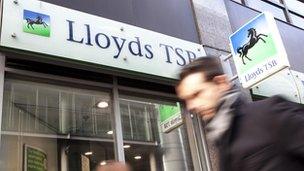Lloyds Banking Group raises PPI bill by a further £1bn
- Published
Lloyds Banking Group has set aside a further £1bn to cover compensation for customers who were mis-sold payment protection insurance (PPI).
It brings the bank's PPI bill to £5.275bn so far.
The further provision means Lloyds has been pushed into a loss of £144m for the third quarter of the year.
After Barclays' recent decision to set aside a further £700m for PPI compensation, the banking industry's bill now stands at just over £12bn.
Despite the news, Lloyds' shares rose 7% in morning trading, as investors took heart from the bank's underlying financial position.
Lloyds described the further PPI provision as a disappointing "legacy issue".
"The volume of complaints received in relation to legacy PPI business during the third quarter declined when compared to the previous quarter," said Lloyds Banking Group's chief executive Antonio Horta-Osorio.
"However, it remained above the level which we anticipated at the time of our half-year results and as a result the group believes it is appropriate to increase its provision for expected PPI costs by £1bn.
"This increases the expected cost of contact and redress, including administration expenses, to £5.3bn," he explained.
The bank warned that the eventual final bill for PPI was still uncertain, suggesting it may rise further.
Marc Gander of the Consumer Action Group said banks still had no incentive to avoid bad behaviour in the future.
"What the banks don't reveal is that while they have had their hands on their customers' money - the ill-gotten money - they have been lending it out at interest rates as high as 28% - compound," he said.
"Yet they are only being required to refund at 8% simple."
More complaints
The cost to the banking industry of compensating customers is rising fast, as complaints from aggrieved customers continue to pour in.
The Financial Ombudsman Service (FOS), which handles grievances that banks reject, has now received half a million complaints from disgruntled people who claim they have been unfairly denied any compensation.
PPI was widely sold by banks in the last decade, and the insurance was supposed to make sure that mortgage and credit card borrowers would be able to repay their loans if they fell ill or lost their jobs.
However, it became apparent that many customers had been mis-sold the insurance because they either did not need it in the first place, or would have been automatically excluded from making a valid claim, typically because they were self-employed.

Lloyds described the PPI bill as a "legacy issue"
Under instruction from the financial authorities, the industry is now going back through past sales and alerting customers to the possibility that they can now make a claim for compensation - a process which is generating a huge bill for the UK's banks.
MoneyBoomerang, an online claims management company, said banks like Lloyds were still stalling on many legitimate claims.
"Lloyds has made a huge additional provision and yet it is not showing any interest in dealing with the very valid claims it is receiving," said the company's managing director, Craig Lowther.
"We are just about to send roughly 8,000 Lloyds cases to the FOS. We firmly believe these are valid claims and if so they will cost the bank millions."
But Lloyds replied that it every incentive to settle legitimate complaints, because banks have to pay for each case that goes to the ombudsman.
"We... have to pay the costs of each claim (£850) as well as incremental administrative costs regardless of who the FOS upholds in favour of," a bank spokesman pointed out.
Improvement
Despite the loss in the third quarter, Lloyds said its underlying financial position was improving.
Although the bank's income has fallen by 14% in the first nine months of the year, this was outstripped by further benefits from cost-cutting - which saw 4,796 jobs cut - and a reduction in the amount of money it has had to set aside for losses on past loans that have turned bad.
Those provisions in its accounts are down to £4.4bn, from £7.4bn in the first nine months of the previous financial year.
With restrictions on sales commission on financial policies being imposed by the Financial Services Authority (FSA) early in 2013, Lloyds has decided to stop offering independent financial advice to anyone who has less than £100,000 to invest.
"Customers with over £100,000 of investible assets who would benefit from holistic financial planning will be referred to our private banking service," the bank said.
"For customers who hold less than £100,000 in savings and investments we will not offer an investment advice service but will continue to give these customers information and help with savings products on a non-advised basis."
Lloyds is still partly owned by the UK taxpayer following its bail-out at the height of the financial crisis in 2008.
As such, it is still not paying any dividends to its investors.
The bank is still in the process of negotiating the sale of 632 of its branches to the Co-operative Bank.
- Published5 November 2012
- Published18 October 2012
- Published11 September 2012
- Published31 August 2012